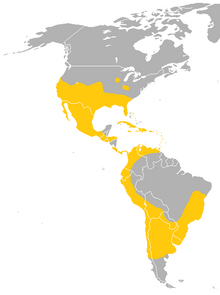
Back Бразилски свободноопашат прилеп Bulgarian Ratpenat cuallarg brasiler Catalan Tadarida brasiliensis CEB Tadarida guánová Czech Mexikanische Bulldoggfledermaus German Tadarida brasiliensis Spanish Tadarida brasiliensis Basque خفاش دمآزاد برزیلی Persian Meksikondoggilepakko Finnish Tadarida brasiliensis French
| Mexican free-tailed bat | |
|---|---|

| |
| Song of male, slowed eight times | |
| Scientific classification | |
| Domain: | Eukaryota |
| Kingdom: | Animalia |
| Phylum: | Chordata |
| Class: | Mammalia |
| Order: | Chiroptera |
| Family: | Molossidae |
| Genus: | Tadarida |
| Species: | T. brasiliensis
|
| Binomial name | |
| Tadarida brasiliensis (I. Geoffroy, 1824)
| |
| Subspecies | |
| |

| |
| Mexican free-tailed bat range | |
The Mexican free-tailed bat or Brazilian free-tailed bat (Tadarida brasiliensis) is a medium-sized bat native to North, Central, and South America and the Caribbean, so named because its tail can be almost half its total length and is not attached to its uropatagium. It has been claimed to have the fastest horizontal speed of any animal, reaching top ground speeds over 99 mph (160 km/h).[2] It also flies the highest among bats, at altitudes around 3,300 m (10,800 ft).[3]
It is regarded as one of the most abundant mammals in North America. Its proclivity towards roosting in huge numbers at relatively few locations makes it vulnerable to habitat destruction in spite of its abundance. For instance, up to 1.5 million bats reside under just one bridge in Austin. The Texas Legislature designated the Mexican free-tailed bat the state (flying) mammal in 1995.[4]
- ^ Barquez, R.; Diaz, M.; Gonzalez, E.; Rodriguez, A.; Incháustegui, S.; Arroyo-Cabrales, J. (2015). "Tadarida brasiliensis". IUCN Red List of Threatened Species. 2015: e.T21314A22121621. doi:10.2305/IUCN.UK.2015-4.RLTS.T21314A22121621.en.
- ^ "Speedy Bat Smashes Speed Record". batcon.org. Bat Conservation International. 9 November 2016. Retrieved 20 October 2023.
- ^ Williams, T. C.; Ireland, L. C.; Williams, J. M. (1973). "High Altitude Flights of the Free-Tailed Bat, Tadarida brasiliensis, Observed with Radar". Journal of Mammalogy. 54 (4): 807. doi:10.2307/1379076. JSTOR 1379076.
- ^ https://capitol.texas.gov/tlodocs/74R/billtext/html/SC00095S.htm
